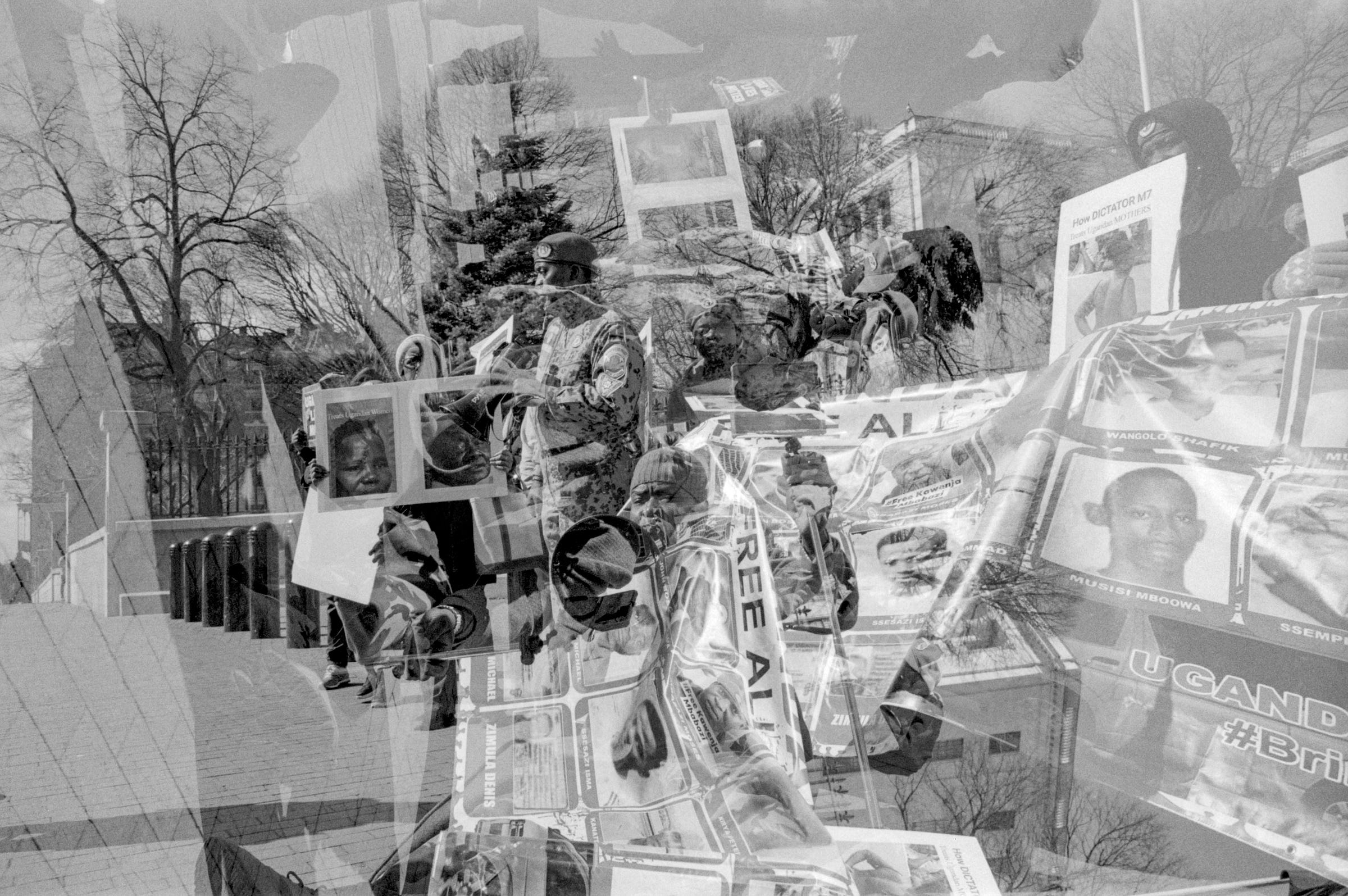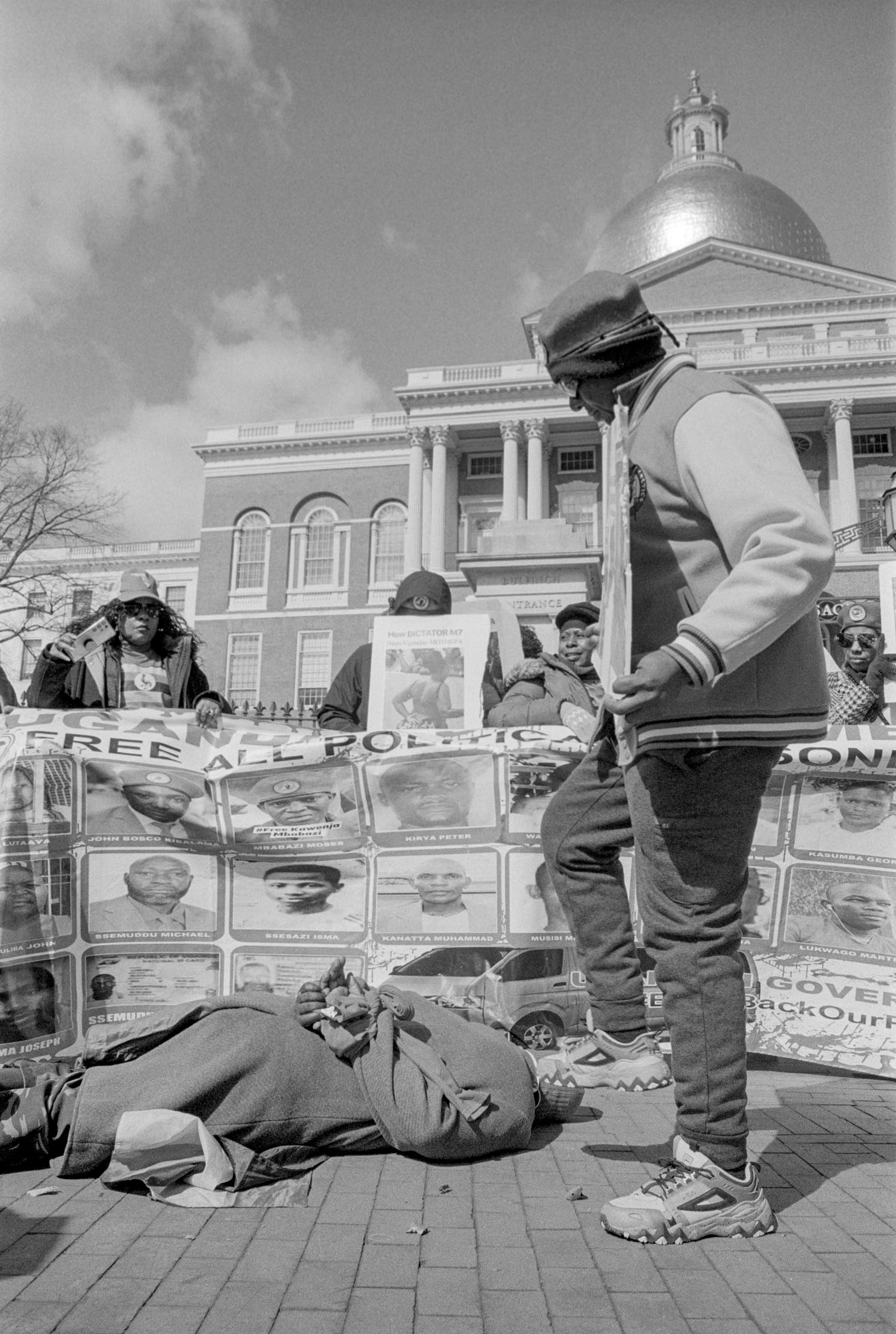Ugandans want America to stop funding their dictator
Ugandan protestors demanded the US divest from Ugandan President Yoweri Museveni’s 40-year-long reign in a rally before the Massachusetts Statehouse on March 7.

The Massachusetts branch of Uganda’s National Unity Platform, run by Waltham chapter leader Marvin Bbaale, called for an end to American foreign aid in Uganda, where President Yoweri Museveni’s controversial 40-year reign has left the nation split. The demonstration took place by the Statehouse on Friday, March 7.
“Museveni has been President for the last 40 years. I’m 40 years old,” said Bbaale. “Elections have not been free or fair. America keeps funding him1. They’re using him to fight Al-Shabaab [terrorist2 organization] in Somalia, but he is failing his country.”

The NUP was founded by pop singer-turned politician Robert Kyagulanyi, or “Bobi Wine,” who ran for President of Uganda four years ago in a mid-January election mired by police brutality amid state-wide internet blackouts. After losing to the President-elect Yoweri Musevei, who has held office since 1986, Kyagulanyi accused him of voter fraud.
Emphasizing democracy, Kyagulanyi’s campaign slogan “people power, our power,” was repeated by Robert Kabuye, a Boston-based NUP member who led the chants on March 7th as a group of protestors marched through the Boston Common before rallying outside the Statehouse.
The banners they waved, the signs they raised, all carried the faces of those they once knew personally; each one a Ugandan political prisoner jailed for speaking up against corruption, according to Kabuye.
“I know all of them. Those are Ugandans who have been kidnapped or killed,” said Kabuye. “I know Dr. Kizza Besigye, he was a political figure who served in the army, he’s in prison right now, almost dying. I know Muvawala, he was a citizen here. They kidnapped him last week.”

Kabuye came to America in 1999 in search of a better life. Despite concerns for his own safety and living day by day, he says someone has to speak up.
Uganda’s median age is 16. More than 75 percent of all Ugandans are under the age of 30. And according to volunteer Kwagala Nakachwa, Museveni’s aging regime has grown too out of touch, failing the next generation’s interests by limiting youth participation in political and civic activities, like voting in elections.
“[Museveni] is 80-years-old. He does not love our country, he loves power,” said Nakachwa. “There is no freedom in Uganda. There is torture. They lie to Americans so they can get money, then they use that money to buy weapons. We are trying to tell the world to stop funding him.”

*the following essay about craft in the first-person is not part of the story and should be evaluated separately. Not an epilogue — an afterword:
Until that day, I had never, apart from the most seldom of exceptions, felt any moral obligation3 to be a reporter. Of course I’d say so in job interviews. I always led with it while networking or otherwise, TA-ing. Professors waxed poetic. Editors spouted. Duty this and duty that, they said. The people need to know, I said.
But sometimes I let a story fall through. It would happen a few times, actually. I went to the event, met everyone, and took their picture, only to put off writing the damn copy. Then a week later, the gravity of what I’d done hit me like a truck. By then I’d be a dithering mess of guilty feelings because I let this news expire. It was frustrating because reporting didn’t come naturally, I thought. I had to work hard. My body didn’t move on its own like everyone else. Maybe we were all faking it. Either way, I still had to pretend like it was my calling too, from day one until the day I blew my brains out, or until the day something clicked for me. Fortunately, it was the former.
So it was a lie, I told myself. And as I grew into graduation’s looming shadow, I was naïve enough to think a half-assed career like that would be enough for me. Writing on deadline, often well into the night, working for free, and getting no thanks made me say “no thanks.” But that’s what duty is, they said. This story is one of a few from the back burner. For what it’s worth, for transparency’s sake. Because on that day, my body really did move on its own and I kind of understood everything.
All I brought was my film camera. One roll. Covering 21st century news? I know, I know. Sue me. I had no idea it would happen. I remember the wind blew and blew; so I just wanted to make a photo of someone’s hair going nuts for darkroom class on Wednesday. That’s why I went outside in the first place. But by then I had already stumbled into some familiar faces in the science march crowd, a huge rally in the Common to protest the administration’s recent lack of evidence-based policymaking. I recognized some journalists and a few speakers. This was Boston’s most terminally educated after all. Gathered in one place. And for once, completely agreeing with each other. Remarkably white. A textbook case of “newsworthy.” The press hung onto every word and no one seemed to hear Robert’s voice breaking in the background. But he didn’t have to be “background noise” because I could do something about that.
Unlike them, I wasn’t on assignment. I probably looked out of place standing with the other reporters; my film camera hung limp amid their tripod-mounted media weapons. So I took my business across the street to act like I actually belonged somewhere because I would’ve been more useful then. I must’ve looked funny4; being the only Asian kid in Uganda. Each of the NUP members took a big risk saying something that day. And I would’ve been beside myself if I didn’t write some of it down.
I wasn’t reporting because someone told me to. Nobody asked. No peer pressure. No cash. I didn’t do it because we were friends and I certainly didn’t do it for me. I had nothing to prove. I simply didn’t have to.
But I did everything the bosses wanted; like asking the tough questions, pressing the camera button — all that and more, I was there. Then I left, which is also something they teach you; and now I’m doing the other part of my job where I document what happened and publish it — as proof of life, as they would say, “bearing witness.”
A journalist is someone who leaves5. Literally, figuratively. The act of which, implies having stayed long enough to know someone else. You are leaving because they can’t.
For example, when the protest is over, I can go home and write. A week later, I’ll have moved on. But Robert still fights. At home, at work, on Facebook. Because everyone dreams of a better tomorrow6. And it’s hard to leave a dream like that behind.
My phone has all but relieved journalists like me of being the first ones to know. Unless we are rival news stations, breaking the news isn’t my priority. Information belongs to everyone, all the time and immediately too. If you wanted, you could learn something new just like that, for free. A lot of it is wrong, however, and some of it is only halfway there — which I think is unacceptable.
So these are my rules:
Information that’s hidden, shouldn’t be.
Information that’s wrong, should be labeled such.
Journalists need to be the first ones to care. Otherwise, no one will. And that’s my tired long-winded contribution to an exhausting performance of society that needs more media literacy. Because profit margins stay high when the kids aren’t alright7, when seniors stay vulnerable, or when Gen Z says jorts are in this summer.
Media manufactures your consent8 — to agree with products, politics, porn, etc., i.e. everyone my age is buying jorts right now because big jorts is trying to sell you more pants by making pants less.
So go pee in the ocean or something, do your part. #freepeesummer
In her book, “Another Fine Mess: America, Uganda and the War on Terror,” journalist Helen Epstein says across the span of his entire four-decade-long incumbency Museveni has earned $20 billion in development assistance, another $4 billion in debt relief, and an undisclosed amount of money towards military aid from the United States alone.
Literally page 19 of this paper by Karen J. Norris:
“To reward Uganda’s support in the international ‘War on Terror,’ … for contributing troops to the Somalian operations against al Qaeda affiliate al-Shabab, the US has consistently provided the Museveni administration with financial and military support,” (Norris 19).
Norris, Karen J., “The Effects of American Involvement in Northern Uganda's Conflict with the Lord's Resistance Army” (2014). Celebration. 58.
There is no official, legally-binding, MCAT or Bar Exam equivalent qualification for being a reporter, it’s not even a fair comparison like you don’t need a degree either. The closest thing we have is the Society of Professional Journalists’ “Code of Ethics,” a free one page pdf that is unenforced and completely voluntary.
“Funny” as in “out of place,” and not “with humor.” There is nothing laughable about Ugandan freedom, the lack thereof, or tokenized Chinese-Ugandan race relations. And especially not with the current administration’s sorry history of evidence-based policymaking either, hence marching for science. For (one) example, this log of denying climate change, recorded by the Sabin Center for Climate Change Law at Columbia University’s “Silencing Science Tracker,” a history of every attempt, both federal and local, unsuccessful or otherwise, to limit the research, education, and distribution of scientific information since 2016. Long live science.
“Past Lives” by Celine Song. I liked you because of who you are; and who you are is someone who leaves, says Hae-sung. Then my plane landed and I left him too.
“A Better Tomorrow” by John Woo — it’s the Chinese Beaver monologue movie, one of the action genre’s finest.
This is actually my favorite Fall Out Boy song.
From the book “Manufacturing Consent: The Political Economy of the Mass Media” by Edward S. Herman and Noam Chomsky, 1988.
Who’s bright idea was it to say that Israel is “pounding” all these countries in their headlines? It’s on Reuters, PBS, Al Jazeera, WaPo, New York Times, etc. Can we please stop “pounding” Gaza? Because it’s not specific enough. In fact, it’s so vague and insensitive that it may actually mislead people.
On one hand, I can explain to classmates why a newsroom would choose to print “the war in Gaza” instead of “the genocide in Gaza” because neutrality is part of what makes journalism ethical in America. But on the other hand, I can explain how there actually is a genocide in Gaza — which is real, and telling that truth is arguably a bigger part of what makes journalism ethical everywhere. Saying so, at least, in a way that minimizes harm, shouldn’t be labeled as antisemitic or divisive, even though it continues to be perceived as such, because the media wins when we fight this war on keyboards too.
So then what are we doing in newsrooms? Duty, I guess — and I’m going to throw up.





oh to leave & be left with another bryan liu banger